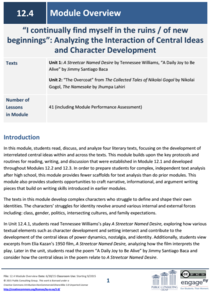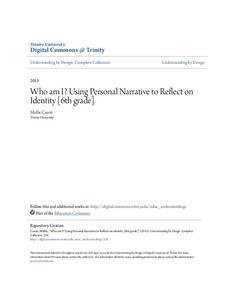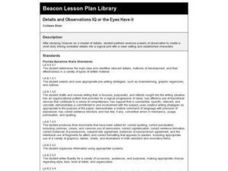EngageNY
Grade 9 ELA Module 2: Unit 1, Lesson 7
Listen to the low, stifled sound that arises from the souls of your ninth graders when overcharged with awe. Inspire them with a captivating instructional activity about "The Tell-Tale Heart." Learners analyze how Poe uses the story...
Charleston School District
Increasing, Decreasing, Max, and Min
Roller coaster cars traveling along a graph create quite a story! The lesson analyzes both linear and non-linear graphs. Learners determine the intervals that a graph is increasing and/or decreasing and to locate maximum and/or...
Ancient Order of Hibernians
Who Was Saint Patrick?
Scholars discover who Saint Patrick was with help from a brief informational text followed by a series of challenge worksheets designed to boost reading comprehension and vocabulary. Class members complete a graphic organizer, take...
EngageNY
Grade 12 ELA Module 4: Literary Analysis
Does identity come from within, or do external forces shape it? Explore the complex identity concept with a two-unit module for 12th-grade language arts. The first unit uses A Streetcar Named Desire by Tennessee Williams and "A Daily Joy...
Trinity University
Who Am I? Using Personal Narrative to Reflect on Identity
Who am I? Pupils work to answer this question through a unit that explores personal narratives and identity. Exit tickets for activities that examine different poems, short stories, and autobiographical writing serve as prewriting for...
Pearson
Practice Test English Language Arts: Grade 8
As teachers, it is our job to encourage learners to stand up for what they believe in and help them learn lessons from life's events. A set of practice questions designed for the ELA MCAS assessment features passages that teach positive...
PBS
Mark Twain: Storyteller, Novelist, and Humorist
Scholars investigate the use of satire in Mark Twain's writing. Literary lovers research the Adventures of Huckleberry Finn and Tom Sawyer, political cartoons, and videos to see how Twain uses satire to make the stories more memorable....
College Board
2006 AP® English Literature and Composition Free-Response Questions
Scholars select a novel or play and then craft an essay that describes the setting's role in the story. Pupils also create essays that analyze a poet's use of language and the values of characters in a novel excerpt.
Curated OER
Story Sequencing Lesson Plans That Promote Creativity
Explore new ways to enhance students' comprehension skills with creative story sequencing lesson plans.
Curated OER
Story Predictions Chart
For this predictions worksheet, learners complete the graphic organizer for a story that helps them predict the outcome of the story.
Curated OER
Network Tree
For this network tree graphic organizer instructional activity, learners record details about the inter-connectedness of a topic of their choice by filling in the 9 ovals.
Curated OER
Author's Podcast
Second graders engage in oral and listening comprehension skills using podcasts. In this comprehension skills lesson, 2nd graders create a podcast where they read an original story. Students then listen and choose to retell the story...
Curated OER
Character Map
In this character map graphic organizer activity, students add details about a character in a story as they record details in the spaces provided.
Curated OER
Details and Observations IQ or the Eyes Have it
Fourth graders study Chaucer as a master of details. Then, they create a short story linking unrelated details into a logical plot with a clear setting and established characters. This lesson plan has some excellent worksheets attached!
Curated OER
What is it...A Frog or a Toad?
Learners write a story. In this frogs and toads comparison activity, students read facts comparing frogs and toads, use a t-chart to record factual information and complete a Venn Diagram. Learners complete a four square writing template...
Curated OER
Getting Ready to Write
Students watch an online slideshow that shows Cornelia Funke's transition from an illustrator to a writer. They discuss her writing process from the way she gathers ideas to how and where she writes. Next, they work in groups to choose a...
Curated OER
Representing Text Story Web: Pretest
In this story web worksheet, students answer multiple choice questions about how to make and use a story web. Students complete 10 questions total.
Read Works
Climax of a Story
Demonstrate how to track the elements of plot in a story. After watching you mark down the rising action, problem, climax, falling action, and resolution for Stone Soup by Jon J. Muth, pupils complete a graphic organizer for Sweet...
Curated OER
Representing Text Story Web: Post Test
In this story web worksheet, students complete a set of 10 multiple choice questions, clicking on an answer link to view correct answers.
Curated OER
Survivor Interview One Survivor’s Story – Edith Birkin Survivor InterviewTopic 6: One Survivor’s Story
In this Holocaust worksheet, students complete a graphic organizer by filling in details about the questions they would ask of a Holocaust survivor.
Curated OER
Picture Story Board
In this story elements worksheet, students sketch 4 pictures to fill a story board graphic organizer. They draw the beginning of their story, two pictures for the middle, and one more for the ending.
Curated OER
Analyzing and Evaluating Literary Works
Young scholars evaluate the literary elements found in short stories. In this literature instructional activity, students read short stories of their choosing and list the examples of the literary elements they encounter in the story on...
Curated OER
The Stories They Tell -- Conclusions Worksheet
In this cycle of life worksheet, students think about data they collected after a visit to graveyard. Any conclusions they draw from the data are charted on the graphic organizer.
Curated OER
Probable Passage Matrix
In this reading worksheet, students use this graphic organizer/story map to record the important parts of a piece of literature. Students record the setting, characters, problem, solution and ending.























